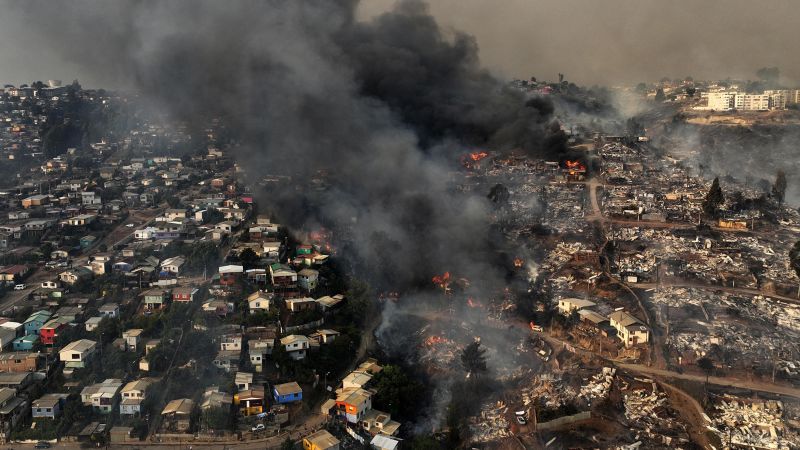Javier Torres/AFP/Getty Images
A forest fire reduces homes to rubble and ash in the mountains of Viña del Mar, Chile on February 3.
CNN
—
The devastating wildfires sweeping across large parts of Chile are believed to be the country's worst on record, with more than 160 blazes battling to contain them, according to the United Nations disaster agency.
According to Chilean authorities, the fire has claimed at least 123 lives and hundreds of people are still missing. Officials said 33 bodies have been identified and 79 autopsies have been conducted.
Hundreds more are missing and the death toll is expected to rise, according to the UN Office for Disaster Risk Reduction.
Wildfires have ravaged central and northern Chile, destroying thousands of homes and buildings and burning neighborhoods to ashes.
President Gabriel Boric said on Tuesday it was the country's “greatest tragedy” after the devastating 8.8-magnitude earthquake that killed hundreds.
“The people of Viña del Mar, Quilpo, in Villa Alemana, are experiencing an extremely catastrophic, exceptional, unprecedented and painful situation,” he said on Tuesday.
Esteban Felix/AP
A view of neighborhoods burned during wildfires in Viña del Mar, Chile on February 5, 2024. The area around Vińa del Mar was hit hard by the country's deadliest wildfires.
Boric declared a state of emergency on Sunday as the fire moved from forest to urban areas, choking coastal towns including Viña del Mar and Valparaiso. Aerial footage of Viña del Mar shows burned streets and rows of destroyed houses.
The President has declared Monday and Tuesday as national days of mourning for those who lost their lives in the fire.
Chile's devastating fires are being driven by the effects of El Niño — a natural climate anomaly with a global warming effect — colliding with the long-term trend of global warming, triggering more intense and frequent droughts and heat waves.
For the past decade, Chile has been struggling A “Great Drought” The longest, at least 1,000 years, puts pressure on water supplies and dries out the landscape, fueling fires.
The country has been scorching with unusually high temperatures for the past few days. Chile's capital Santiago reached 37.3 degrees Celsius (98.6 degrees Fahrenheit) on January 31, the country's third-highest temperature in more than a century, according to the World Meteorological Organization.
January reports that Chile has seen a dramatic increase in wildfire activity over the past few years study Published in the journal Nature, because high temperatures, drought and strong winds create the perfect conditions for intense and destructive fires.
The study found that a total of 1.7 million hectares have been burnt in the country in the last decade.

